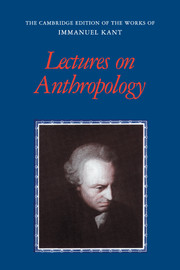Book contents
- Frontmatter
- Contents
- General editors’ preface
- Preface
- Abbreviations
- General introduction
- Anthropology Collins 1772–1773
- Anthropology Parow 1772–1773
- Anthropology Friedländer 1775–1776
- Anthropology Pillau 1777–1778
- Translator's introduction
- Lecture of the Winter Semester 1777–1778 based on the transcription Pillau
- Menschenkunde (1781–1782?)
- Anthropology Mrongovius (1784–1785)
- Anthropology Busolt, 1788–1789
- Editorial notes
- Glossary
- Bibliography
- Index
Lecture of the Winter Semester 1777–1778 based on the transcription Pillau
[Excerpts]
Published online by Cambridge University Press: 05 April 2013
- Frontmatter
- Contents
- General editors’ preface
- Preface
- Abbreviations
- General introduction
- Anthropology Collins 1772–1773
- Anthropology Parow 1772–1773
- Anthropology Friedländer 1775–1776
- Anthropology Pillau 1777–1778
- Translator's introduction
- Lecture of the Winter Semester 1777–1778 based on the transcription Pillau
- Menschenkunde (1781–1782?)
- Anthropology Mrongovius (1784–1785)
- Anthropology Busolt, 1788–1789
- Editorial notes
- Glossary
- Bibliography
- Index
Summary
[a] ANTROPOLOGIA. PROLEGOMENA.
There is no greater or more important investigation for human beings than the cognition of the human being. But this has been held by many to be very easy, and that from the following causes:
(1) It was believed that no discipline is needed for it, because this can be learned very easily in the ordinary course of things and so it was held to be easy, although not unnecessary. It is the same with morals: It was believed that they are important, but it would be superfluous to make a science of them.
(2) It was not held to be all that important: For human beings are for the most part the greatest object we consider. All passions are even directed only at human beings. On the other hand, it was held not to be so necessary because it appeared that the behavior of human beings has no laws. Yet this consideration of human beings is one of the most pleasant matters.
We can consider this cognition of the human being in two ways:
(1) As a speculative cognition. There mere inquiry satisfies the understanding’s desire for knowledge.
(2) As a pragmatic cognition that does not lead to further cognition insofar as it serves a utility already settled on.
If it is treated pragmatically, then it is knowledge of the world and helps to form or educatec a man of the world.
- Type
- Chapter
- Information
- Lectures on Anthropology , pp. 261 - 280Publisher: Cambridge University PressPrint publication year: 2012



